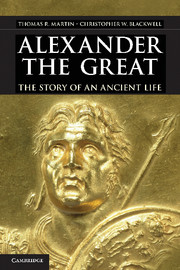Book contents
- Frontmatter
- Contents
- Acknowledgments
- Introduction: The Goal of this Book
- Map 1: European Greece, Macedonia, and Northern Lands
- Map 2: Alexander's Expedition
- 1 The World of Alexander's Birth and His Education in Literature and Warfare (350s and 340s BC)
- 2 Opportunities and Risks asa Teenager (340s to 338 BC)
- 3 The Danger in Replacing a Murdered Father as King (337 to 335 BC)
- 4 The Opening Battles Against the Persian Army (334 to 332 BC)
- 5 Finding God in Egypt and Capturing the Riches of Persia (332 to 330 BC)
- 6 Winning the World as King of Asia (330 to 329 BC)
- 7 Murder, Marriage, and Mixing Customs in Afghanistan (329 to 327 BC)
- 8 Victory and Frustration in India (327 to 326 BC)
- 9 Returning to Babylon and Becoming Divine (326 to 323 BC)
- 10 Remembering and Judging Alexander (323 BC to Now)
- Suggested Readings
- Index
8 - Victory and Frustration in India (327 to 326 BC)
Published online by Cambridge University Press: 05 November 2012
- Frontmatter
- Contents
- Acknowledgments
- Introduction: The Goal of this Book
- Map 1: European Greece, Macedonia, and Northern Lands
- Map 2: Alexander's Expedition
- 1 The World of Alexander's Birth and His Education in Literature and Warfare (350s and 340s BC)
- 2 Opportunities and Risks asa Teenager (340s to 338 BC)
- 3 The Danger in Replacing a Murdered Father as King (337 to 335 BC)
- 4 The Opening Battles Against the Persian Army (334 to 332 BC)
- 5 Finding God in Egypt and Capturing the Riches of Persia (332 to 330 BC)
- 6 Winning the World as King of Asia (330 to 329 BC)
- 7 Murder, Marriage, and Mixing Customs in Afghanistan (329 to 327 BC)
- 8 Victory and Frustration in India (327 to 326 BC)
- 9 Returning to Babylon and Becoming Divine (326 to 323 BC)
- 10 Remembering and Judging Alexander (323 BC to Now)
- Suggested Readings
- Index
Summary
After Alexander killed Cleitus, things got worse: his Macedonians and Greeks were increasingly hostile to the changes he made. It galled them to see barbarians, defeated barbarians, sitting on seats of power and basking in the king's favor. Tension grew when Alexander attempted another innovation in the protocol at court. The new step was to expand the use of the Persian custom of prostration; this decision perhaps reflected Alexander's growing sense of his own nature, mixing the human and the divine. In observing this custom, Persians were not worshipping a king as a god. Their religion saw the Great King as an earthly agent of the god Ahura Mazda, but the agent was not himself divine. Greeks saw this custom differently. For them prostration was a posture of adoration and worship practiced in the temples of the gods, before the statues of divinities; it served as a concrete sign in the human world recognizing the deities’ supernatural existence. If Macedonians or Greeks prostrated themselves before Alexander, they would have been implying, at the very least, that their leader was more than human.
In the months after Cleitus’ murder, Alexander conducted an experiment to see if prostration could be accepted as normal protocol in his court, at least when non-Europeans were present in the audience. He discussed his plan ahead of time with a select group of Macedonians and Greeks in his inner circle. They agreed to observe the custom at a carefully orchestrated occasion. Alexander purposely did not order non-Persians to prostrate themselves before him; they would voluntarily follow the lead of his inner circle. The historian Callisthenes was one of those who promised to set the example, as was the philosopher Anaxarchus.
- Type
- Chapter
- Information
- Alexander the GreatThe Story of an Ancient Life, pp. 131 - 148Publisher: Cambridge University PressPrint publication year: 2012



